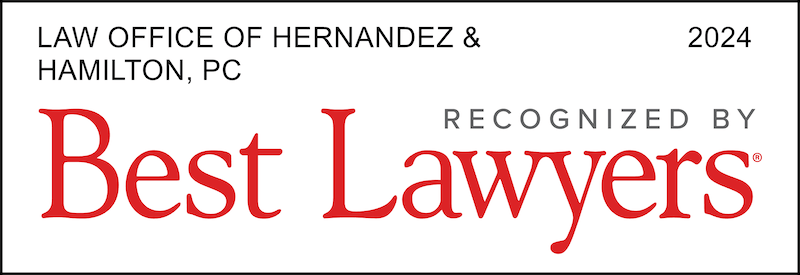Tucson Criminal Appeals Lawyer
If you have recently been found guilty of a crime, or had a judge issue an adverse ruling against you on a pivotal legal issue in your case, then it is time to consult with a Tucson criminal appeals lawyer about your legal options. You may be able to file for a direct appeal, a special action, a writ of habeas corpus, or a petition post-conviction relief. The lawyers at Law Office of Hernandez & Hamilton, PC, have a proven track record of helping their clients win appeals in criminal cases throughout Arizona and the United States. Our attorneys have won some of the biggest, most high profile criminal appeals in Arizona state history in the area of criminal law. We regularly practice before the Arizona Court of Appeals, the Arizona Supreme Court, and the Ninth Circuit Court of Appeals. We have even handled cases as the lead attorneys-of-record in criminal matters before the United States Supreme Court in Washington, D.C. Contact our criminal appellate attorneys today to learn how an appeal could help your situation.

What is a Criminal Appeal?
A criminal appeal, or direct appeal, is a legal petition to have a decision made by a trial court reviewed again by a higher court. Upon appellate review, the higher court may overturn the trial court’s decision, agree with and enforce the decision of the original trial, or send the case back down to the trial court for a retrial. Appeals typically go first to the intermediate-level appellate court (for example, appeals from the Superior Court go to the Arizona Court of Appeals, and appeals from the federal district court for the District of Arizona go to the Ninth Circuit Court of Appeals in San Francisco, CA). Subsequent appeals can go from the intermediate-level appellate court to the highest court of final resort (which in Arizona, is the Arizona Supreme Court, and in the federal system is the United States Supreme Court). In addition, some appeals may be taken from the Arizona Supreme Court to the United States Supreme Court in certain situations.
Deadlines for Appeals
The Arizona criminal appeals process has strict deadlines and rules. The federal system is no different. Failure to follow deadlines and court system rules may result in being excluded from seeking relief. Time is of the essence for appeals. For all jury trial convictions, a defendant must typically file a Notice of Appeal within 14 days of their conviction with the clerk of the court where their case was heard. This is the way to put parties on notice that a direct appeal will be pursued by the Appellant (the criminal defendant filing the appeal). All death penalty convictions will be automatically appealed to the Arizona Supreme Court directly.
After the Notice of Appeal is filed, Arizona criminal procedure states that the appellant must order copies of all trial records, including the written transcripts, evidence, and exhibits. The appellate court must have all the transcripts, evidence, and exhibits that the original court had (which is called the appellate record) to render a decision. A qualified appeals attorney can help you meet Arizona’s rules and deadlines, and discuss with you the policies and procedures of perfecting your appeal and winning your case on appeal. If you or a loved one have been convicted of a crime, contact Hernandez & Hamilton, PC for a free consultation to discuss your appeal options.
What Are The Grounds to Appeal a Criminal Conviction?
A criminal defense appeal must have solid legal grounds, and they must be based on the record. An appeal is not just to have another bite at the apple, or ask for a “do-over” of your case. One cannot appeal just because they want a new trial or because they feel that the jury verdict was wrong and they want to reverse the conviction. In order to have sufficient basis for the appeal, the appellant must indicate a specific procedural or legal error that occurred during the original trial. This error must also be shown to be material to the case, typically meaning something that must have impacted the overall outcome of the case had the error had not occurred. Some common grounds to appeal a case include the trial court improperly denying a defense motion, legal error, procedural error, improper jury instructions, or even prosecutorial misconduct.
- Ineffective assistance of counsel: Generally speaking, ineffective assistance is not a proper subject of a direct appeal. More commonly, ineffective assistance of counsel is raised in a post-conviction relief proceeding such as a Rule 32 petition in state court or a 2255 petition in federal court. However, they are limited scenarios where ineffective assistance of counsel may be raised in a direct appeal. When raising an ineffective assistance of counsel claim, the appellant or petitioner has to prove that their attorneys did not provide adequate legal representation under the Sixth Amendment right to counsel in such a way that the ruling can be made based off of the record itself. This is a very hard standard to prove.
- Legal or Procedural Errors: Legal errors include instances in which the law was misapplied at the trial court level. Legal errors include the admission of evidence that unfairly prejudiced the jury, improperly excluded evidence, and improper jury instructions. Procedural issues are related to the conduct of the trial. Examples include wrongful denial of a motion to suppress or admission of improper evidence or testimony at trial, just no name a few.
- Misconduct or Abuse of Discretion: Misconduct may have occurred by the prosecution, the judge, or jurors.
If you believe that your conviction was the result of some material error or abuse of discretion, then you may have a strong case for an appeal or other post-conviction relief. Contact a criminal defense attorney in Tucson to talk about how to appeal your case.
Post-Conviction Relief
A post-conviction relief petition is when a convicted defendant files for relief under Rule 32 of the Arizona Rules of Criminal Procedure in trial cases or Rule 33 of the Arizona Rules of Criminal Procedure in a plea agreement case. In federal law, these petitions are brought under 28 U.S.C. 2255 or 2241. These petitions are how persons wrongfully convicted or sentence can raise claims that there is either new evidence available, or that there are issues that were unknown or, for some reason, that was not available at trial. Another common ground to raise in such petitions is ineffective assistance of counsel. Such petitions then gives the original court an opportunity to correct any irregularities that may have occurred at the trial or sentencing. Post-conviction relief rulings can be appealed, however, such appeals are discretionary and the appellate court does not have to hear the case unless the petitioner is able to convince it to do so.
Habeas Corpus Petition
A Writ of Habeas Corpus is another type of post-conviction relief petition that usually can only be filed with a defendant when all other appeals have been exhausted. It questions the Constitutional rights issues related to the defendants’ imprisonment. Habeas Corpus petitions are filed with the U.S. District Court and will be heard before a federal court judge. There are also state court habeas corpus-type petitions which can be brought in state court under limited circumstances.

How Can An Attorney Help Me With An Appeal?
Criminal appeals are very arduous and time-consuming. It is not something that comes naturally to all attorneys. In fact, many criminal defense attorneys have little or no experience in litigating appellate matters. Due to the difficulty of the appellate process, there are very few criminal defense lawyers also specialize in appeals. However, it is crucial to have adequate representation if you want your appeal heard before an Arizona court and, more importantly, if you want to win your case on appeal. Your life and liberty are at stake! Do not risk it by trying to figure out the process alone.
If you have been wrongfully convicted of a crime, you may receive serious penalties, including a prison sentence. If you have already lost at trial, then you have a huge barrier to overcome. You will need to have a persuasive legal argument to succeed at the appellate level. Reach out to Hernandez & Hamilton, PC, Arizona’s top criminal defense law firm, to speak with the area’s top-rated criminal appeals attorneys.
Experienced Criminal Appeals Lawyer
If you or a loved one has a criminal conviction, you need to act swiftly to win the case on appeal. Our attorneys have won dozens of appeals in both state and federal matters. We regularly appear before the Arizona Court of Appeals, the Arizona Supreme Court, and the Ninth Circuit Court of Appeals. We have also handled appeals before the United States Supreme Court. The appeal process in Arizona is complex, and you will need the help of an experienced attorney. Your chance of a successful appeal depends on putting forth the right evidence and legal basis. Contact the criminal appeals lawyers at Hernandez & Hamilton, PC, today for a free consultation.





